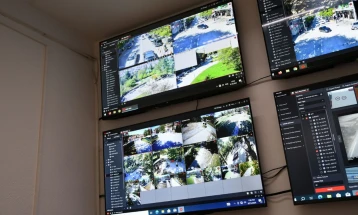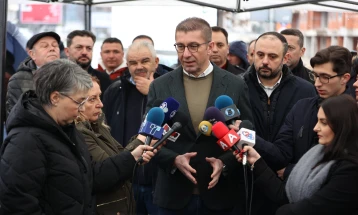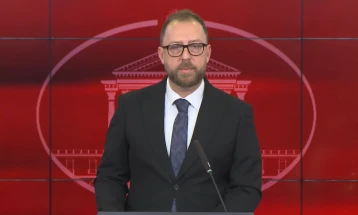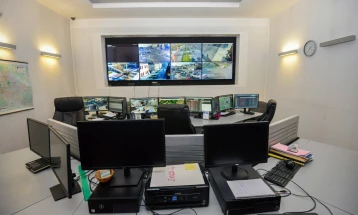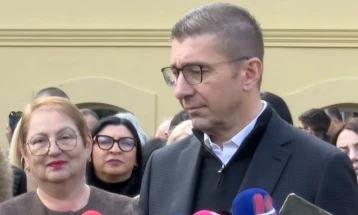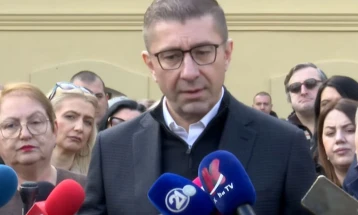Geer: EU membership perspective probably best tool for preventing brain drain in region
- The countries of the Western Balkans are the ones that suffer the most when it comes to the issue of brain drain. In order to tackle this issue, activities are necessary to change the narrative by promoting positive conditions for professional fulfillment of young people here, in the region, in their home countries, through the creation of European jobs and education reform that will prepare young people for future professions, concluded the panelists at the “Developing Skills & Providing Opportunities: Strategies for Tackling Brain Drain” panel Thursday at the Prespa Forum Dialogue in Struga.
- Post By Angel Dimoski
- 16:14, 15 June, 2023

Struga, 15 June 2023 (MIA) –The countries of the Western Balkans are the ones that suffer the most when it comes to the issue of brain drain. In order to tackle this issue, activities are necessary to change the narrative by promoting positive conditions for professional fulfillment of young people here, in the region, in their home countries, through the creation of European jobs and education reform that will prepare young people for future professions, concluded the panelists at the “Developing Skills & Providing Opportunities: Strategies for Tackling Brain Drain” panel Thursday at the Prespa Forum Dialogue in Struga.
According to the panelists, compared to ten years ago, when people sought any job they could get, today the people in the region are looking for better paid jobs and better conditions.
The EU Ambassador to North Macedonia, David Geer, said the enlargement process as a transformation of society, does not solve all issues, including the issue of brain drain.
“The issue of movement of people, is of course a huge issue within the EU itself. The enlargement process which is transformative and is the key to resolving this issue does not resolve it overnight, we’ve seen this with Poland, Bulgaria with Croatia. Even within the EU itself, there are movements between rural areas and cities, which make it difficult to ensure sustainable development. The perspective for joining the EU is probably the best tool to find lasting solutions to the issue of brain drain,” said Geer.

When it comes to North Macedonia, the EU Ambassador said the country stands at the doorstep of the largest market in the world of 450 million consumers, with potential for further growth. According to Geer, the main question is how to boost the living standard in the country and make it competitive with the standard in the EU, in order to reverse the brain drain process.
“The process of EU accession offers fantastic tools to address those issues, but of course it has to be driven from within the country itself. The other positive that comes with the European perspective is increased direct foreign investments, and you’ve seen increases in foreign direct investments since 2018 of around 7 percent per year. As the country continues its path, so it will continue to see more and more investments,” said Geer.
When it comes to improving productivity and raising the living standard, he pointed to the necessity of investments in education and boosting of professional skills.
“There is an enormous number of tools, I am reasonably optimistic for two reasons. First of all, politics follows interest, and I think what we are seeing now, that the mutual interest to see this region in the EU is very great, in terms of economics, security, democracy. And the second thing is that makes me very optimistic, is just listening to people here who passionately believe that change can happen,” said Geer.

The Head of the Directorate for Technological Industrial Development Zones, Jovan Despotovski, touched upon the negative projections according to which the countries of the Western Balkans could lose up to a third of their population in the next decade, noting that something must be done about it as soon as possible.
“The field that I am engaged in is promoting investments in the country, to create jobs, when we say jobs we would like to bring European jobs to the people of North Macedonia. In the past two and a half years, we’ve created 4.500 new jobs, for the first time the average wage in the companies from the free economic zones was higher than the national average,” said Despotovski.
According to Despotovski, the Government offers grants to foreign investors, but now, he said, the practice is a bit different, assistance is now provided to those companies who provide well-paid jobs.

The Director of the National Agency for European Educational Programs and Mobility, Marko Gjorgievski, said that the Erasmus+ program has been promoting youth mobility for three decades, allowing young people to study abroad, develop a global worldview, acquire new skills and create connections with other people and organizations.
“Erasmus not only benefits the individuals participating, but also contributes to the economies of the participating countries, it creates a cycle where young people return to their home countries with newfound knowledge and skills, becoming catalysts for innovation and progress,” said Gjorgievski.
